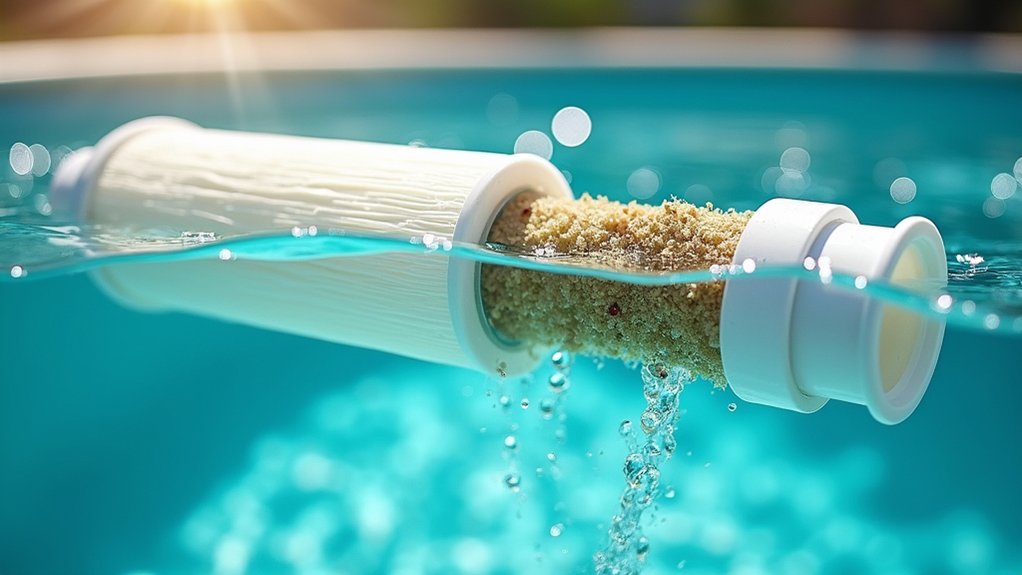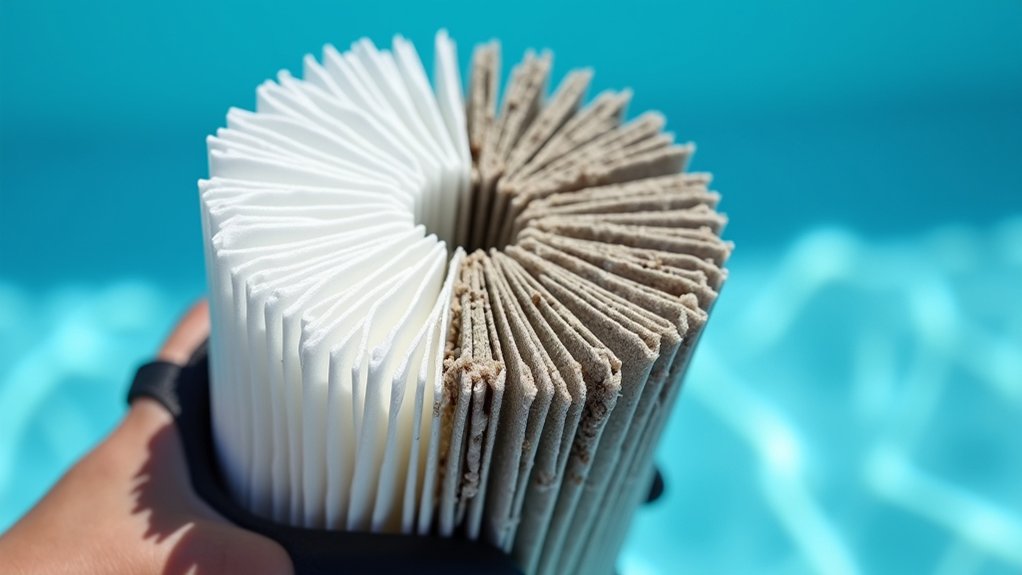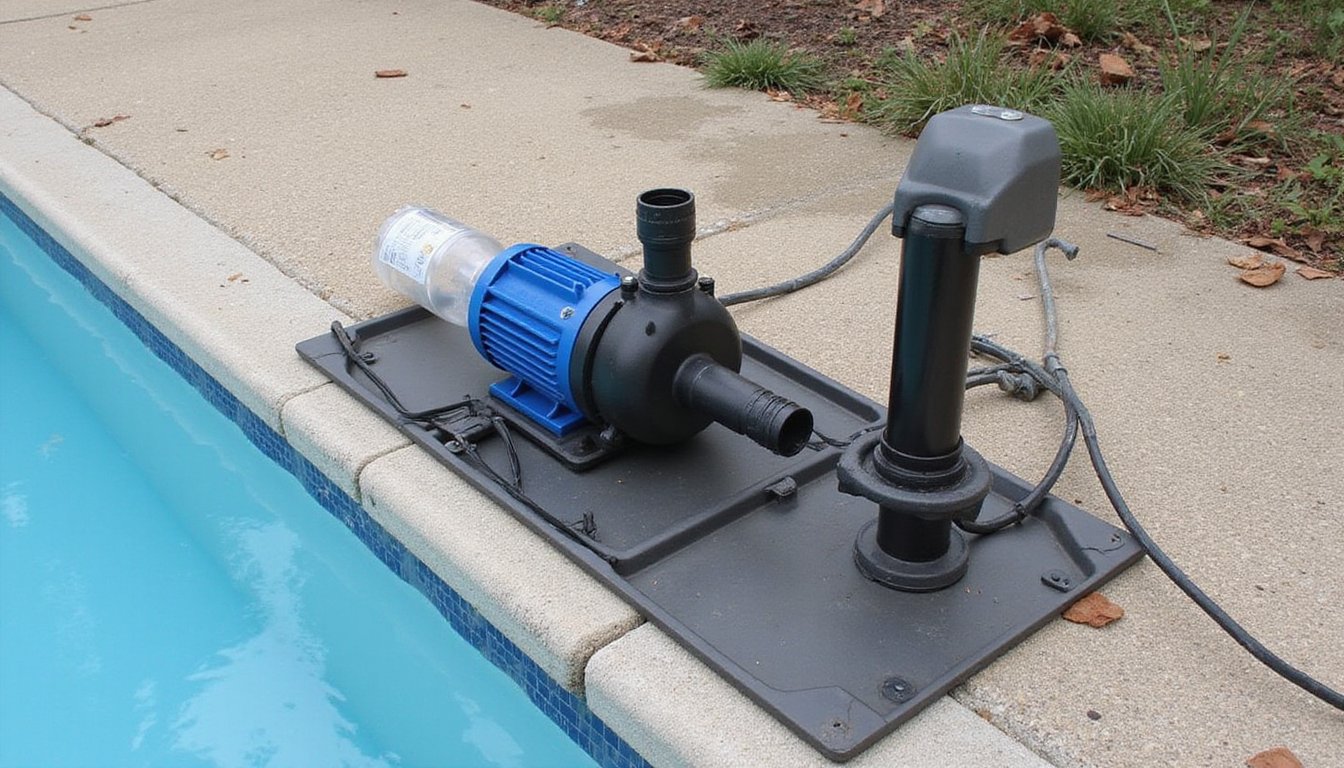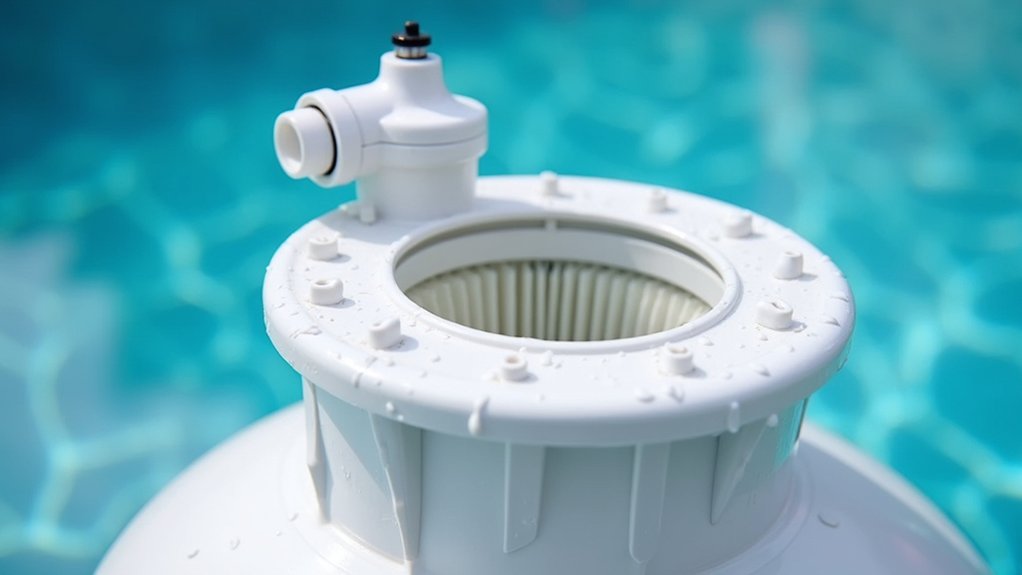Your pool filter functions as the essential mechanical barrier that traps suspended debris, dirt, leaves, hair, and insects, while eliminating harmful pathogens like Cryptosporidium and Giardia that chlorine alone can’t destroy. It removes disinfection byproducts such as trihalomethanes and chloramines, which trigger respiratory issues and skin irritation. By maintaining proper circulation and water clarity, your filter reduces eye infections and allergic reactions while minimizing chemical dependence. Understanding how each component works together reveals significant savings and extended equipment longevity.
How Pool Filters Remove Contaminants and Debris From Swimming Water
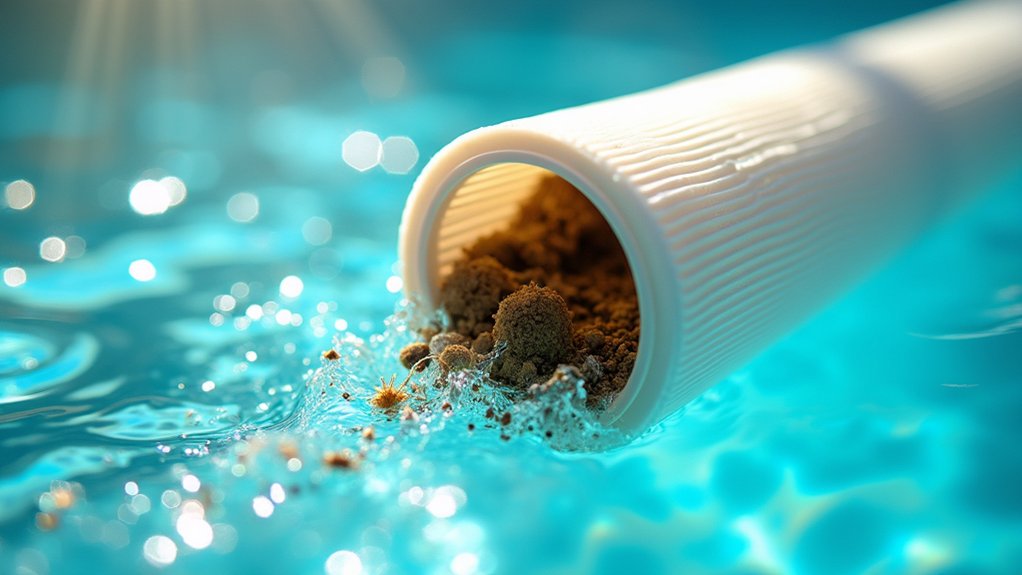
Pool filters function as the primary mechanical barrier between contaminated water and swimmers, continuously trapping suspended debris such as dirt, leaves, hair, and insects within specialized filter media. Your filter removes particulate matter down to micrometer levels, sand filters typically capture particles ≥10–15 μm, while enhanced filters target ≥2 μm particles.
Leaf and debris entrapment occurs as water cycles continuously through the system, accumulating contaminants rather than returning them to your pool. Cartridge media outperform basic sand filters for microplastic capture and fine particle removal, achieving over 99% filtration efficiency. Water flows through the skimmer and main drain into the pool pump, where a spinning impeller pushes water toward the filter media for contaminant removal. Beyond visible debris, filters also capture microscopic threats including bacteria and algae that pose significant health risks to swimmers. Proper maintenance of pool filters is crucial for extending the filtration system’s lifespan and ensuring consistent water quality.
You’ll notice improved water clarity directly correlating with physical particle removal. This mechanical action reduces organic precursors that react with chlorine, decreasing disinfection by-product formation and limiting chlorine consumption requirements. Regular filtration maintains optical clarity while supporting your pool’s overall chemical treatment effectiveness.
The Critical Role of Filtration in Protecting Swimmer Health
Beyond trapping visible debris, filtration systems actively defend your health by eliminating microorganisms and chemical byproducts that pose genuine risks to swimmers. You’ll experience increased swimmer comfort when filtration removes Cryptosporidium and Giardia, pathogens chlorine alone can’t always destroy. Effective filtration also reduces trihalomethanes and chloramines, harmful disinfection byproducts linked to respiratory issues, skin irritation, and asthma.
Improved water clarity directly correlates with reduced eye and skin infections. You’ll notice fewer instances of conjunctivitis and allergic reactions when organic debris doesn’t react with disinfectants. Robust filtration maintains neutral pH levels and minimizes particulate matter that triggers irritation. Filtered pool water encourages swimmers to stay hydrated, as cleaner, better-tasting water increases fluid consumption and supports cardiovascular function. Clean filters prevent cloudy water and harmful by-products, ensuring consistently safe swimming conditions.
For vulnerable groups, children and immunocompromised individuals, efficient filtration systems provide critical protection by lowering systemic toxin exposure through ingestion and skin absorption, supporting your overall wellness and preventing chronic health complications. Natural filtration systems work alongside mineral content to balance water chemistry and reduce the need for excessive chemical treatment.
Understanding Your Pool Filter System Components and Circulation Process

While filtration removes harmful contaminants, you’ll only achieve reliable protection through understanding how your pool’s circulation system actually works. Your pump draws water through suction lines connected to the skimmer and main drain, propelling it through your chosen filter type, sand, cartridge, or DE. Each mechanism traps particles at different micron levels before returning clean water via jets. During filter system installation, guarantee proper valve and piping connections to maintain sealed-system integrity. For system troubleshooting, monitor your pressure gauge regularly; rising readings indicate cleaning needs. Empty skimmer and pump strainer baskets frequently to prevent clogging. Check O-rings and clamps for leaks. This continuous circulation prevents stagnation, distributing chemicals evenly while eliminating algae and bacteria growth hazards. The skimmer collects floating debris before it sinks to the bottom of the pool, protecting your filtration system from unnecessary strain. Sand filters require correct pump sizing to prevent dirt from bypassing the sand bed and compromising water clarity. The pool pump serves as the driving force that powers your entire circulation system, making it essential for maintaining consistent water flow throughout your pool equipment.
Maintaining Crystal Clear Water Through Proper Filter Operation
Understanding your circulation system’s mechanics sets the foundation, but you’ll achieve crystal-clear water only through consistent filter operation and maintenance. You must maintain an adequate flow rate to guarantee uniform distribution of chemicals and prevent stagnant zones where contaminants accumulate. Clean your cartridge filters every three to four months, backwash sand filters when pressure rises eight to ten PSI, and recharge DE filters biannually. Clogged media sharply reduces clarity by restricting flow and trapping debris. Monitor pressure gauges regularly; they signal when cleaning’s needed. Proper filtration removes organic matter that feeds algae growth, reducing your reliance on chemical treatments. Different filter types offer varying levels of filtration precision, with DE filters capable of trapping particles as small as 3-5 microns for the clearest water possible. A dirty filter strains your pool pump, potentially leading to costly mechanical failures if left unaddressed. By prioritizing consistent maintenance routines, you’ll sustain exemplary water clarity, support safer swimming conditions, and extend your equipment’s lifespan.
Extending Equipment Lifespan and Reducing Chemical Dependence With Effective Filtration
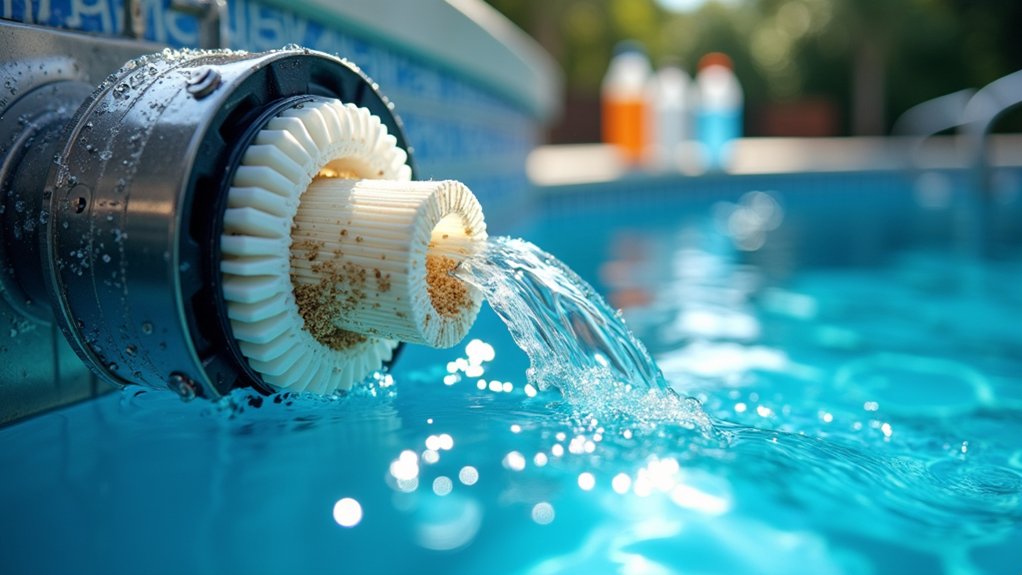
Two critical benefits emerge when you commit to effective filtration: you’ll dramatically extend your equipment’s operational life and substantially reduce your chemical consumption. Professional maintenance delivers approximately 40% longer filter life compared to DIY care, while proper water chemistry maintenance can add up to three years to filter longevity.
You’ll achieve reduced maintenance costs, potentially saving $800–$1,200 over five years on early replacements. Well-maintained filters require roughly 30% fewer chemicals annually, translating to $100–$200 in direct savings. Smart monitoring systems extend both filter and pump lifespan by 2–3 years through early intervention. Different filter types demonstrate varying lifespans, with sand filters lasting 5-7 years while cartridge filters typically require replacement within 2-3 years. Maintaining optimal water chemistry, keeping pH between 7.2-7.6, can extend filter life by up to three additional years. Regular inspection for visible cracks, tears, or warped filter parts helps you catch problems early and prevent costly replacements.
Clean filters minimize debris accumulation, decreasing pump strain and enabling increased energy efficiency. You’ll experience lower chemical demand, fewer algae treatments, and reduced chloramine formation. This optimized performance means fewer expensive equipment breakdowns and substantially lower operational expenses throughout your equipment’s lifetime.
Frequently Asked Questions
How Many Hours per Day Should I Run My Pool Filter During Peak Season?
During peak season, you should run your pool filter 8–12 hours daily for ideal filtration schedule. A practical rule: operate your pump one hour per 10°F of outside air temperature. For example, at 90°F, run it nine hours. You’ll achieve at least one complete water turnover daily, maintaining clarity and sanitization. If you’ve got variable-speed equipment, program 3–4 hours at high speed during midday and 8–9 hours at low speed overnight. Adjust filter run duration based on bather load and weather conditions.
What Is the Difference Between Backwashing, Rinsing, and Recirculating Filter Modes?
You’ll use three distinct filter maintenance modes to optimize your pool’s cleanliness. Backwashing reverses water flow to expel trapped debris through waste lines, your primary filter cleaning method. Rinsing follows Backwashing, settling media and removing residual particles before returning to normal filtration. Recirculating bypasses filtration entirely, circulating water for chemical mixing without filtering. Follow this filter cleaning schedules sequence: backwash→rinse→filter mode. Skipping rinse risks recontaminating your pool, so maintain proper sequencing religiously for peak filter performance.
How Do I Know When My Pool Filter Needs Cleaning or Backwashing?
You’ll know your filter needs cleaning when you notice the pressure gauge reading 8–10 PSI above baseline or detect reduced water flow. Watch for cloudy water, weak return jets, or visible debris remaining in your pool. You shouldn’t ignore these signs; they indicate clogged filter media that’ll shorten your filter’s lifespan. Always turn off your pump before backwashing. Monitor your pressure gauge regularly; it’s your best indicator for timely maintenance scheduling.
Which Filter Type Removes the Smallest Particles: Sand, Cartridge, or DE?
DE filters remove the smallest particles, down to 1–5 microns. You’ll find DE’s crystalline filter media type captures microscopic contaminants like algae and bacteria that other filters miss. However, you’ll need shorter filter replacement intervals than sand or cartridge options, making DE more complex and costly. If you’re prioritizing crystal-clear water and don’t mind frequent maintenance, DE’s superior performance justifies the investment for ideal pool clarity.
Can Pool Filters Remove Bacteria and Algae Spores From Swimming Water?
Yes, you can remove bacteria and algae spores using pool filters, though you’ll need proper filter media composition and consistent maintenance. You’ll achieve 23–95% bacterial reduction depending on your filter type and media, sand filters remove 23–69%, while advanced perlite media exceed 90%. However, you shouldn’t rely on filtration alone. You’ll need to increase your filter cleaning frequency and pair filtration with chemical disinfection like chlorination or ozonation for complete pathogen elimination and safe swimming water.

